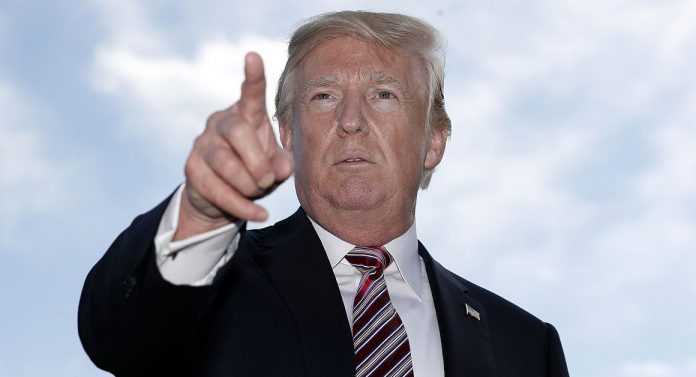President Trump made one thing clear after his meeting with President Vladimir V. Putin on Monday: He is willing to take Mr. Putin’s word over those of his own intelligence agencies about whether the Russians tried to fix the 2016 election.
Such an admission by a president sworn to be the principal defender of the Constitution and America’s sovereignty in the world is extraordinary enough. But it was only one of several statements made by Mr. Trump, the likes of which no other American president has ever uttered on foreign soil.
He condemned the Justice Department’s investigation of his campaign’s ties to Russia as a “disaster for our county.” He suggested that the F.B.I. deliberately mishandled its investigation of Russia’s hacking of the Democratic National Committee. And he labeled an F.B.I. agent who testified about that investigation before Congress as a “disgrace to our country.”
n the fiery, disruptive, rules-breaking arc of Mr. Trump’s statecraft, the president’s remarks in Helsinki on Monday marked an entirely new milestone, the foreign policy equivalent of Charlottesville.
ust as Mr. Trump flouted the most deeply held traditions of the American presidency in equating the torch-wielding marchers and the leftist activists who fought them in Virginia last summer, he shredded all conventional notions of how a president should conduct himself abroad. Rather than defend America against those who would threaten it, he attacked his own citizens and institutions while hailing the leader of a hostile power.
Mr. Trump’s goal, it seemed, was to fight, tooth and claw, for the legitimacy of his election victory. In the process, he impugned the nation’s law enforcement agencies and publicly undermined the consensus view of its intelligence agencies that Russia interfered in the campaign.
When asked whether he would use this moment to denounce Russia for its behavior, Mr. Trump acknowledged that his own director of national intelligence, Dan Coats, and other senior officials had told him that Russia was culpable.
But, the president declared, “I have President Putin. He just said it’s not Russia.” He added, “I will say this: I don’t see any reason why it would be.”
Then he unleashed a fusillade of accusations about Hillary Clinton and her missing emails, the F.B.I. and the D.N.C.’s missing computer server, and the testimony of the F.B.I. agent, Peter Strzok. He also offered a defiant defense of his “brilliant” campaign victory, reminding reporters in Helsinki of the electoral-college margin, 306 to 232.
To a domestic audience, many of Mr. Trump’s assertions were familiar — the grist for countless early-morning tweets or stream-of-consciousness outbursts during political rallies. But to hear Mr. Trump utter them while standing next to the leader of the very country accused of carrying out those actions was a spectacle of an entirely different order.
The president’s performance provoked an immediate reaction.
“No prior president has ever abased himself more abjectly before a tyrant,” Senator John McCain, the Arizona Republican, said in a statement.
John O. Brennan, who served as C.I.A. director under President Barack Obama, said, “Donald Trump’s news conference performance in Helsinki rises to & exceeds the threshold of ‘high crimes and misdemeanors.’ It was nothing short of treasonous.”
As he did after white supremacists beat their opponents in Charlottesville, Mr. Trump reached in Helsinki for a kind of moral equivalence.
“I hold both countries responsible,” he said, when asked whether he held Russia responsible for anything. “I think that the United States has been foolish. I think we’ve all been foolish. We should’ve had this dialogue a long time ago — a long time, frankly, before I got to office.”
While the president lashed out at all manner of domestic enemies, he said nothing about Russia’s annexation of Crimea, its predatory behavior toward Ukraine, its bloody intervention in Syria, or the alleged poisoning of a former Russian spy on British soil.
So disorienting was Mr. Trump’s performance that at times, it fell to Mr. Putin to try to cushion the blow.
When a reporter asked whether Mr. Trump had raised objections to Russia’s annexation of Crimea in 2014, Mr. Putin answered that of course the American president had objected. Mr. Trump was silent.
When Mr. Trump was asked whether he had pressed Mr. Putin on the issue of Russian interference, Mr. Putin replied, “Where do you get this idea that I trust President Trump or that he trusts me? He defends the interests of the United States of America, and I do defend the interests of the Russian Federation.”
Yet on perhaps the most unsettling question of all — whether Russia had compromising material on the president — Mr. Putin offered Mr. Trump no comfort. Instead of simply saying no, he observed that Mr. Trump was one of hundreds of American business people who had visited Russia.
“Do you think we try to collect compromising material on each and every single one of them?” Mr. Putin asked.
By MARK LANDLER






























